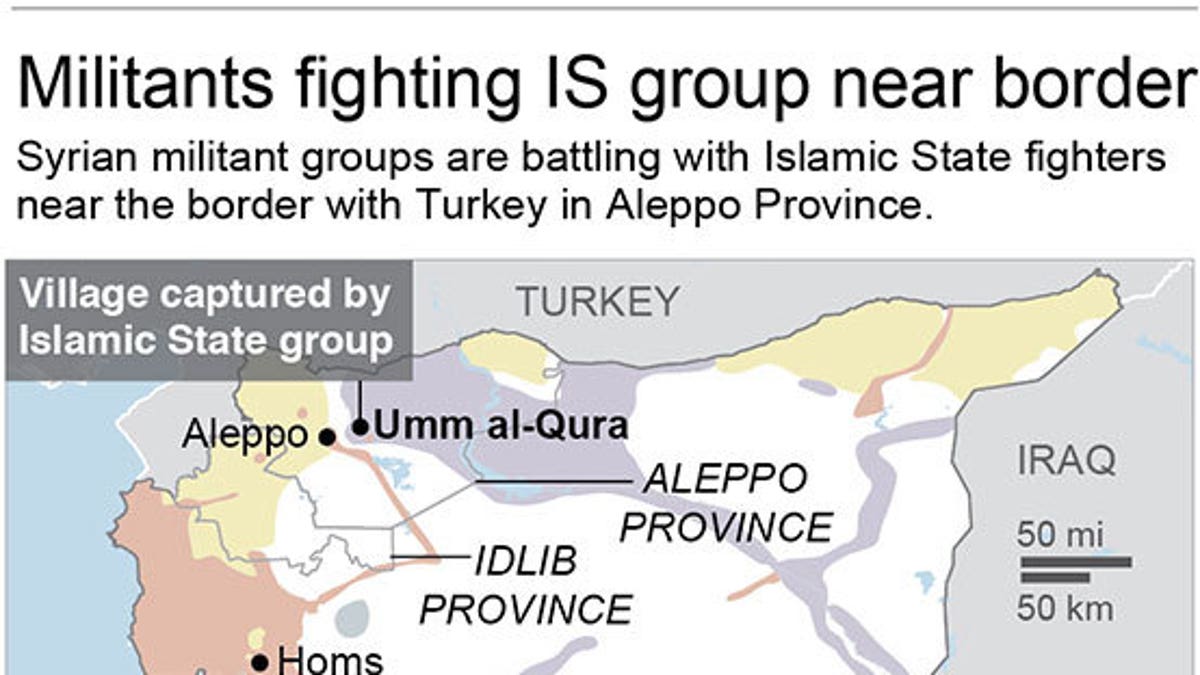
Map shows areas of control in Syria; 2c x 3 inches; 96.3 mm x 76 mm; (The Associated Press)
BEIRUT – Militants from the Islamic State group launched a major attack on the predominantly Kurdish city of Hassakeh, activists and Syrian state media said Wednesday, in an apparent attempt by the extremist group to reverse some of the advances made recently by Kurdish fighters in the northeastern province.
In Paris, meanwhile, a U.S. official said that some 10,000 Islamic State fighters have been killed by U.S.-led airstrikes since they began last year.
"We have seen enormous losses for Daesh. More than 10,000 since the beginning of this campaign. That will end up having an effect," Deputy Secretary of State Tony Blinken told France Inter radio, using an Arabic acronym for the group.
In September, the CIA said that Islamic State group has up to 31,500 fighters. Despite losing thousands of fighters, the extremists continue to attract more recruits from around the world who come to fight with the group in Syria and Iraq.
Kurdish fighters have captured dozens of towns and villages in Hassakeh province with the help of airstrikes by the U.S. -led coalition and are getting close to Tel Abyad, a major Islamic State-held border town near Turkey.
The extremists launched the push on the city of Hassakeh, which is split between government forces and Kurdish defenders, on Tuesday night.
Syrian state TV said extremists are battling for control of a juvenile prison still under construction on Hassakeh's southern edge and have so far attacked it with five suicide car bombs.
The TV said government warplanes have struck the Islamic State stronghold of Shaddadeh, south of Hassakeh. An Islamic State-affiliated Facebook page said the airstrikes on Shaddadeh destroyed seven homes without causing any casualties.
Syria's state news agency SANA said another suicide car bomb targeted the city's power station, causing damage and a power outage.
The Britain-based Syrian Observatory for Human Rights said the Syrian air force is also taking part in the battle around Hassakeh and that Islamic State gunmen have entered the prison building. The group said dozens of fighters were killed on both sides, adding that IS brought reinforcements of about 400 fighters from the nearby province of Deir el-Zour.
Meanwhile, in the Qatari capital of Doha, U.S. envoy John Allen said Iraq's so-called Popular Mobilization Forces — which include Iranian-backed Shiite militias — have a role to play in helping take back territory from Islamic State militants in the Sunni-dominated Anbar province, but that they must fall under Baghdad's control.
Speaking Wednesday at the U.S.-Islamic World Forum, Allen said leaders in Anbar "do not view these forces through strictly a sectarian prism" and understand they do not only include Shiite hard-liners.
"But we also remain very attentive to and concerned about extremist militia elements frequently influenced and led by the Iranian leadership," he continued. "It is critical that all forces in the battle space fall under the command and control of the government of Iraq."
The role of the militias is contentious among many Sunnis in Iraq, who fear they could enhance Shiite powerhouse Iran's influence in the country and exacerbate the very sectarian tensions that IS militants seek to exploit.
Allen, a retired Marine Corps general, is President Barack Obama's envoy for the global coalition against the extremist group.
